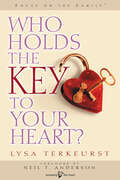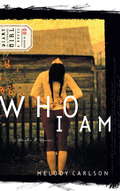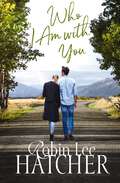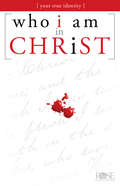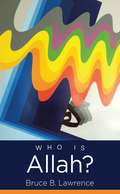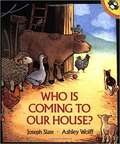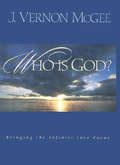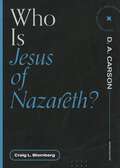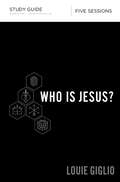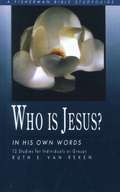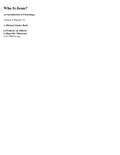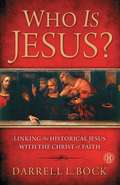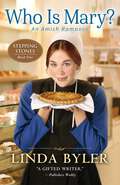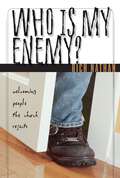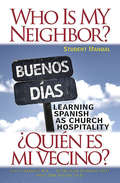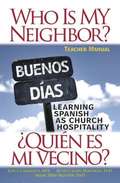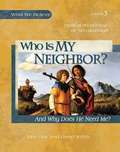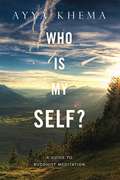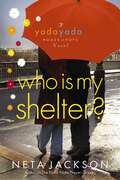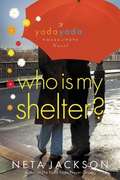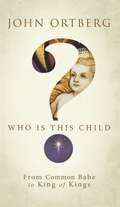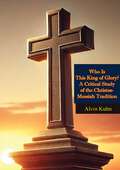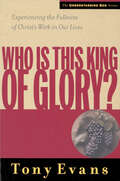- Table View
- List View
Who Holds the Key to Your Heart?
by Lysa TerKeurstInside the hearts of most women lies a "secret place" containing hidden thoughts, painful experiences, and emotions that they feel are better left alone. But God wants to have all of their hearts and desires to set them free from guilt and shame. Lysa TerKeurst offers Who Holds the Key to You Heart? as a practical tool to help women identify their shame and lead them to hope and healing through Scripture. Women will be renewed through a deeper understanding of their identity in Christ and break the bondage hidden in their secret place.
Who Holds the Key to Your Heart?
by Lysa TerKeurstInside the hearts of most women lies a "secret place" containing hidden thoughts, painful experiences, and emotions that they feel are better left alone. But God wants to have all of their hearts and desires to set them free from guilt and shame. Lysa TerKeurst offers Who Holds the Key to You Heart? as a practical tool to help women identify their shame and lead them to hope and healing through Scripture. Women will be renewed through a deeper understanding of their identity in Christ and break the bondage hidden in their secret place.
Who I Am
by Melody CarlsonIt's challenging enough to be a normal high school senior -- but Caitlin O'Conner has a host of new difficulties to deal with in the third book of Melody Carlson's widely popular and fascinating teen series. Time is critical to help the orphans in Mexico, missions-minded Caitlin believes, but Mom and Dad are set on her attending college. Meanwhile, her relationship with Josh takes on a serious tone via e-mail -- threatening her commitment to "kiss dating goodbye." When Beanie begins dating an African-American, Caitlin's concern over dating seems to be misread as racism. One thing is obvious: God is at work through this dynamic girl in very real but puzzling ways. A soul-stretching time of racial reconciliation at school and within her church helps her discover God's will as never before.From the Trade Paperback edition.
Who I Am (Diary of a Teenage Girl: Caitlin #3)
by Melody CarlsonIt's challenging enough to be a normal high school senior -- but Caitlin O'Conner has a host of new difficulties to deal with in the third book of Melody Carlson's widely popular and fascinating teen series. Time is critical to help the orphans in Mexico, missions-minded Caitlin believes, but Mom and Dad are set on her attending college. Meanwhile, her relationship with Josh takes on a serious tone via e-mail -- threatening her commitment to "kiss dating goodbye." When Beanie begins dating an African-American, Caitlin's concern over dating seems to be misread as racism. One thing is obvious: God is at work through this dynamic girl in very real but puzzling ways. A soul-stretching time of racial reconciliation at school and within her church helps her discover God's will as never before.From the Trade Paperback edition.
Who I Am with You: Who I Am With You, Cross My Heart, How Sweet It Is (A Legacy of Faith Novel)
by Robin Lee HatcherFor these two broken hearts, the first step toward love will be a huge leap of faith. Jessica Mason isn’t looking for love when she meets Ridley Chesterfield. <P><P>Instead she is still reeling from the tragic, unexpected loss of her husband and daughter—and awaiting the arrival of her unborn child. Harboring the secret of her husband’s betrayal, her pain is deeper than anyone knows. <P><P>Ridley Chesterfield is hiding out in Hope Springs, Idaho, avoiding a political scandal and the barrage of false media headlines that have tarnished his good name. The last thing Ridley wants is a relationship—but when fate leads Ridley to form a friendship with his reclusive and pregnant neighbor, he wonders if this small-town hideout might be more of a long-term destination. <P><P>When Jessica begins to read her great-grandfather’s Bible, she finds a connection with a man she never knew. Somehow the verses he marked and the words he wrote in the margins open her heart to healing. <P><P>And as Ridley and Jessica help each other forgive the people who have wronged them, they must decide if the past will define them or if they will choose to love again. <P><P>Who I Am With You weaves together a modern-day romance with Jessica’s great-grandfather’s story from the 1930s, reminding us that some truths can cross generations and that faith has the power to transform families forever.
Who I am in Christ
by Rose PublishingThe Who I Am in Christ ebook reminds us what God has done through His Son, Jesus.We can live with confidence and hope because we are "forgiven," "beloved," "new creatures," "rescued," "made alive," "loved," and and that's just the beginning! Each of the 30 traits has a Bible reference. Be reminded and reassured of the many qualities and characteristics you possess as a believer. This will be treasured for years. Ways to use this ebook•personal worship•time alone with God•Sunday school classes•small groups or home fellowships•new believers•discipleship•counseling•recovery/addiction groups•single mothers groups•pastoral counseling•hospital and hospiceStudy Questions for Personal or Group Use•Read panels 1-2. Pick one or two traits that believers have as a result of having faith in Jesus Christ. Look up the Scripture references. How does this connect with your life, and why is it meaningful to you? •Read panels 3-4 on "Who God created me to be." Pick one of these traits and look up the Bible references. Why did you select this one? How would you apply it to your life?•Read panels 5-6 on "Who I am on my own (when I ignore God)?" Even after putting faith in Christ, people still face the temptation to live life for themselves. Look up the verses for this trait and read them aloud. What practical ways can a person let go of their selfish patterns?•Read panel 7. The Apostle Paul was a very important person before he started following Christ. Compare what he says about his life before and after. What strikes you as most important?•Read panels 8-10 on "Who I will be in Christ." Pick one favorite and read the verses. Why is this promise encouraging to you?•Read panels 11-13 and focus on panel 13. How are you a member of Christ's body? How are you willing to serve?
Who Is Allah?
by Bruce B. LawrenceThis vivid introduction to the heart of Islam offers a unique approach to understanding Allah, the central focus of Muslim religious expression. Drawing on history, culture, theology, politics, and the media, Bruce B. Lawrence identifies key religious practices by which Allah is revered and remembered, illuminating how the very name of Allah is interwoven into the everyday experience of millions of Muslims. For Muslims, as for adherents of other religions, intentions as well as practices are paramount in one's religious life. Lawrence elucidates how public utterances, together with private pursuits, reflect the emotive, sensory, and intellectual aspirations of the devout. Ranging from the practice of the tongue (speaking) to practices in cyberspace (online religious activities), Lawrence explores how Allah is invoked, defined, remembered, and also debated. While the practice of the heart demonstrates how Allah is remembered in Sufism, the mystical branch of Islam, the practice of the mind examines how theologians and philosophers have defined Allah in numerous contexts, often with conflicting aims. The practice of the ear marks the contemporary period, in which Lawrence locates and then assesses competing calls for jihad, or religious struggle, within the cacophony of an immensely diverse umma, the worldwide Muslim community.
Who Is Coming to Our House?
by Ashley Wolff Joseph Slate"Who is coming to our house? Someone, someone," says Mouse. As Pig makes room, Lamb cleans up, Goose stacks the hay, and Duck lines the crib with eiderdown, Mary and Joseph are on their way by donkey. All the animals welcome the baby Jesus to their home.
Who Is God?
by Vernon McgeeHow do you understand the dimensions, power, mind, will, and love of God when He is beyond definition? Dr. J. Vernon McGee unravels the mystery of who God is and offers a solid theological understanding for the layman. Thoroughly biblical, Who Is God? dos not attempt to put Him in a box, but instead examines the biblical revelation and affirms that though God cannot be measured by human standards, He does reveal Himself to us. From learning about the Trinity to discussing God's character, Dr. McGee gives both believer and nonbeliever wise counsel on who God is and how He makes Himself known to us.
Who Is Jesus of Nazareth? (Questions for Restless Minds)
by Craig L. BlombergWhat you can know about Jesus. Jesus is the most influential person in history. But not everyone agrees on who he was. Was he a fraud, a failed savior, or the Messiah? What can you know for sure about him? In Who is Jesus of Nazareth?, Craig L. Blomberg shows what you can know about Jesus and how you can know it. There is a wealth of information about Jesus from ancient sources, whether Christian or non--Christian, oral traditions or written manuscripts. Blomberg guides you through these sources, so you can investigate them for yourself. Explore the evidence about Jesus and why he matters today. The Questions for Restless Minds series applies God's word to today's issues. Each short book faces tough questions honestly and clearly, so you can think wisely, act with conviction, and become more like Christ.
Who Is Jesus? Bible Study Guide
by Louie GiglioThe question has been asked and debated for generations. Some call him Lord. Some say he was a good man, a prophet, or a teacher. Still others call him a lunatic or liar. History, culture, and Scripture agree that all of life centers on your answer to this one question: Who Is Jesus?In this five-week video Bible study (DVD/digital video sold separately), Pastor Louie Giglio invites us to meet God in both our intellect and our hearts by uncovering what history and Scripture have to say about Jesus. Throughout the study, you'll witness how Jesus appeared and shaped the landscape of history, just as he shapes the landscape of our lives for eternity.For those just beginning to ask questions about him and those who have known him for a long time, the Who Is Jesus? Bible Study is a journey toward discovering the truth about history's most monumental figure and humanity's opportunity to know him personally.Sessions include:Good or God?Friend or Foe?King or Pawn?A Way or the Way?The Lion or the Lamb?Designed for use with the Who Is Jesus? Video Study (9780310094579) sold separately.
Who Is Jesus? In His Own Words: In His Own Words (Fisherman Bible Studyguide Series)
by Ruth E. Van RekenThis study guide leads you through pivotal passages of Scripture with word pictures we can all understand to see who Jesus claimed to be.
Who Is Jesus?: An Introduction To Christology
by Thomas P. RauschWho is Jesus? This is the fundamental question for christology. The earliest Christians used various titles, most of them drawn from the Old Testament or Hebrew Scriptures, to express their faith in Jesus. They called him prophet, teacher, Messiah, Son of David, Son of Man, Lord, Son of God, Word of God, and occasionally even God. In Who Is Jesus? Thomas Rausch, S.J., focuses on the New Testament's rich variety of christologies.
Who Is Jesus?: Linking the Historical Jesus with the Christ of Faith
by Darrell L BockIS JESUS WHO HE SAID HE WAS? Some say he was just a man; others claim he was the Son of God. Historian Darrell Bock tests the authenticity of Jesus’ claims against the rules of history to find out if he truly is the Christ of Faith. This reader-friendly book examines twelve events, sayings, and teachings of Jesus, using ten well-accepted historical rules. Pull up a chair, engage in the conversation, and discover how fascinating the discussion of the historical Jesus can be.
Who Is Mary?: An Amish Romance (Stepping Stones)
by Linda BylerThe first book in a new Amish romance series by beloved novelist Linda Byler, an active member of the Amish church. With her copper red hair and inquisitive personality, Mary is an anomaly in her Amish community in western New York. She tries to join in the fun with the other youth as they gather for hymn singings and games, but she finds it all rather dull. None of the young men are interested in her and she's even less interested in them. With each passing year, she feels more and more out of place and stifled by life as a misfit in a rural Amish community. When her aunt comes for a visit and suggests she return to Lancaster with her to help manage her bakery, Mary sees her opportunity for the change she's desperately craving. But her parents forbid her to go, her father convinced that leaving the family for the busy life of Lancaster will lead her down a path of destruction. Mary is deeply distressed, wanting to honor her parents' wishes and also knowing she can't stay trapped in their isolated community forever. At twenty-one, she's old enough to decide for herself, and yet it's painful to be at odds with her father. Will she go, despite her father's dire warnings? If she stays, will she just continue to disappoint her parents, asking too many questions and never finding a man to marry? One thing is sure. Before she can even think about dating, she needs to figure out who she is and where she belongs. And that might require a boldness she didn't know she possessed.
Who Is My Enemy?: Welcoming People the Church Rejects
by Rich NathanAre You at War with Someone Jesus Loves? Many Christians are. We find it much easier to judge those outside the church than to love them. Yet Jesus did not come to condemn the world, but to save it. It is time we took on his attitude of servanthood--time to share not canned presentations, but our hearts and lives. Rich Nathan helps us understand how. Tackling five knotty current issues, he takes us inside the worldviews and street-level realities of postmodernists, New Agers, homosexuals, feminists, and liberals in order to better understand them, and to see beyond categories to real faces, real needs, and real hearts that long to be welcomed. Nathan reveals both the errors that we must challenge, and unexpected truths that will challenge us. Most important, he helps us to see individuals who long to experience the redemptive touch of Jesus--through us.
Who Is My Neighbor? Student Manual: Learning Spanish as Church Hospitality
by Ruth Cassel Hoffman Joyce Carrasco, M.A. Ngoc-Diep NguyenWho Is My Neighbor? (¿Quién es mi vecino?) is a field-tested resource through which English speakers of any church and congregation can learn basic Spanish-speaking skills to be able to communicate and provide a welcoming atmosphere to the Hispanic communities surrounding them. The six-session resource developed by the Northern Illinois Conference covers basic conversational Spanish, and simple and easy to follow Spanish-language worship material. The program encourages openness toward Spanish-speaking neighbors, understanding of different cultures, and compassion for those who struggle to learn English. This resource is easily implemented by congregations of any size, and it results in a program of hospitality that will help include Hispanic communities in your church congregation.
Who Is My Neighbor? Teacher Manual: Learning Spanish as Church Hospitality
by Ruth Cassel Hoffman PH.D. M.T.S. Joyce Carrasco Ngoc-Diep Nguyen PH.D.Who Is My Neighbor? is a field-tested resource through whichEnglish speakers of any church and congregation can learn basicSpanish-speaking skills to be able to communicate and provide awelcoming atmosphere to the Hispanic communities surrounding them. Thesix-session resource developed by the Northern Illinois Conferencecovers basic conversational Spanish, and simple and easy to followSpanish-language worship material. The program encourages opennesstoward Spanish-speaking neighbors, understanding of different cultures,and compassion for those who struggle to learn English.This resource is easily implemented by congregations of any size,and it results in a program of hospitality that will help includeHispanic communities in your church congregation.
Who Is My Neighbor?: And Why Does He Need Me?
by John Hay David WebbRecommended by Chuck Colson on BreakPoint! The third book in the award- winning What We Believe series helps children understand what it means to be salt and light to the world (Matthew 5:13-14). This study will encourage kids to develop a Christlike servant attitude based on these biblical truths: God created me to be a blessing to the world; God chooses to work through me; I can make a difference at home, in my community, and at church; the church is God's family; the church is one body with many gifts; and I am an important member of Jesus' body.
Who Is My Self?
by Ayya KhemaSelf-transformation is an essential element in all forms of Buddhist meditation--from Tantra to Zen. Ayya Khema, author of the best-selling Being Nobody, Going Nowhere, uses one of the earliest Buddhist suttas to guide us along the path of the oldest Buddhist meditative practice for understanding the nature of "self." By following the Buddha's explanation with clear, insightful examples from her years of teaching meditation, she guides us back and forth between the relative understanding and higher realizations of the Buddhist concept of "self." Her thoughtful contemplation of the Buddha's radical understanding of "self" and her practical advice for achieving insight offer the reader a profound understanding of the "self." Both beginning and advanced practitioners will greatly benefit from Ayya Khema's warm and down-to-earth exposition of the Buddha's meditation on "self."
Who Is My Shelter? (A Yada Yada House of Hope Novel #4)
by Neta JacksonGabby knows God is the God of second chances. But can she give one to the man who betrayed her? When she was thrown out of the penthouse she shared with her husband and their sons, Gabby didn't know if she'd ever find a soft place to land. But after seeking refuge at the shelter where she works, extraordinary things happen as she is reintroduced to God. From the ashes of her marriage comes the House of Hope--a safe haven for homeless moms and their children. But now those ashes of her destroyed marriage are being stirred again. When her long-gone husband's life hits rock bottom, he reappears and asks for one more chance. And Gabby faces what feels like an impossible choice. Take him back. Or keep moving forward without him. Toward someone new who hasn't betrayed her. Is God redeeming what Gabby thought was gone forever? Or is He leading her down a different path and giving her something--and someone--new?
Who Is My Shelter? (Yada Yada House of Hope, Book #4)
by Neta JacksonGabby knows God is the God of second chances. But can she give one to the man who betrayed her? When she was thrown out of the penthouse she shared with her husband and their sons, Gabby didn't know if she'd ever find a soft place to land. But after seeking refuge at the shelter where she works, extraordinary things happen as she is reintroduced to God. From the ashes of her marriage comes the House of Hope-a safe haven for homeless moms and their children. But now those ashes of her destroyed marriage are being stirred again. When her long-gone husband's life hits rock bottom, he reappears and asks for one more chance. And Gabby faces what feels like an impossible choice. Take him back. Or keep moving forward without him. Toward someone new who hasn't betrayed her. Is God redeeming what Gabby thought was gone forever? Or is He leading her down a different path and giving her something-and someone-new?
Who Is This Child?: From Common Babe to King of Kings
by John OrtbergThe child in Bethlehem would grow up to be a friend of sinners, not a friend of Rome. He would spend his life with the ordinary and the unimpressive. He would pay deep attention to lepers and cripples, to the blind and the beggar, to prostitutes and fishermen, to women and children. He would announce the availability of a kingdom different from Herod’s. A kingdom where blessings—full value and worth with God—was now conferred on the poor in spirit and the meek and the persecuted. People would not understand all this meant. According to pastor and bestselling author John Ortberg in Who Is This Child, we still do not. But a revolution was starting, a slow, quiet, movement that began at the bottom of society and would undermine the pretensions of the Herods. It was a movement that was largely underground, like a cave around Bethlehem, where a dangerous baby was born and hidden from a king. Strange reversal. Men who wore purple robes and glittering crowns and gaudy titles began to look ridiculous. And yet the figure of the child born in a manger only grew in stature. Adapted from John Ortberg’s book, Who Is This Man?
Who Is This King of Glory? A Critical Study of the Christos-Messiah Tradition: A Critical Study Of The Christos-messiah Tradition
by Alvin KuhnAlvin Kuhn’s "Who Is This King of Glory? A Critical Study of the Christos-Messiah Tradition" is a thought-provoking and scholarly examination of the origins and evolution of the Christos-Messiah concept. Kuhn, a distinguished philosopher and historian of religion, delves deeply into ancient texts, religious traditions, and historical contexts to unravel the complex and often misunderstood identity of the Messiah.Kuhn's book offers a comprehensive analysis of the Christos-Messiah tradition, tracing its roots back to pre-Christian and pagan mythologies. He explores how ancient civilizations, including the Egyptians, Greeks, and Persians, influenced the development of the messianic figure that would later become central to Christian theology. Through meticulous research and critical insight, Kuhn sheds light on the syncretic nature of religious beliefs and the ways in which early Christian thinkers adopted and adapted existing myths and symbols."Who Is This King of Glory?" challenges conventional understandings of the Messiah by presenting a broader historical and cultural perspective. Kuhn examines the symbolic and allegorical meanings behind the Christ figure, emphasizing the spiritual and philosophical messages that transcend literal interpretations. His work encourages readers to consider the Christos not merely as a historical figure but as a universal archetype representing the divine potential within every human being.Kuhn's writing is both accessible and erudite, making complex ideas understandable for a wide audience. His critical approach invites readers to question traditional narratives and to explore the deeper spiritual truths that underpin religious traditions. The book is richly annotated with references to ancient texts, providing a valuable resource for further study.This compelling study not only enhances our understanding of religious history but also inspires a deeper appreciation for the timeless quest for spiritual enlightenment and the universal themes that connect humanity across cultures and epochs.
Who Is This King of Glory?: Experiencing the Fullness of Christ's Work in Our Lives
by Tony EvansDo you want to be challenged to deepen your understanding of the characteristics and requirements of Almighty God? The Understanding God Series contains the bulk of Pastor Tony Evans' compelling and hard-hitting resources on the essentials about God, Jesus Christ, the Holy Spirit, Spiritual Warfare, and prophecy. Now available in paperback, readers will not want to be without a single book in the series by this popular and powerful speaker and author.Jesus' parables and teaching come alive in this sweeping study of the four gospels. Tony Evans shines fresh light on the words of Jesus, giving readers a more personal understanding of Christ's personality and His work on earth.
